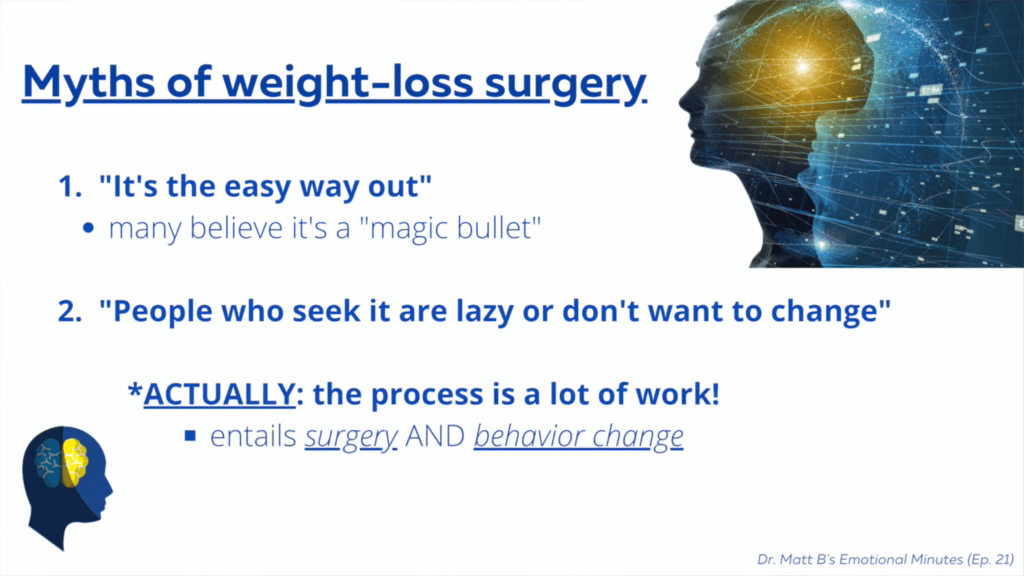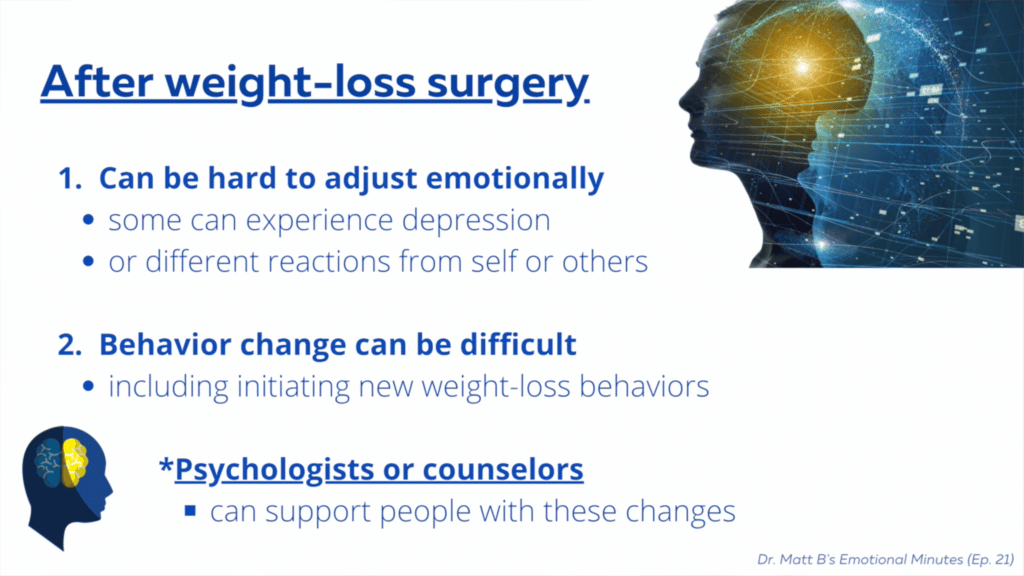There are multiple psychological aspects of losing weight in general and for having bariatric weight loss surgery (e.g., gastric bypass surgery, sleeve gastrectomy or “sleeve surgery”). Many people ask “Why is there a psychological evaluation before bariatric surgery?” This clip discusses multiple reasons for psychological evaluation as well as some of the myths surrounding bariatric weight loss surgery. These types of surgeries can have a positive or negative effect on mood and there are many behavioral changes necessary to aid success after surgery.
Welcome back, I’m Dr. Matt B and these are your Emotional Minutes. Today we will talk about weight loss surgery and the psychology of weight loss surgery. You may know someone who is undergoing weight loss surgery or who has before. You may have even experienced it yourself or are considering it for yourself now.
Myths about Weight Loss Surgery
First of all, there are a couple of myths around weight loss surgery I want to address.
A lot of times, people think weight loss surgery is an easy way out or a magic bullet that the patient used because they couldn’t lose weight in other ways. Other negative beliefs about the patient include that they were lazy, didn’t want to change their habits, or something.

In reality, weight loss surgery requires a ton of habit change; it’s a difficult process that entails being ready to make changes, education around what foods to eat, and a restricted food and exercise regimen.
Psychologists in the Weight Loss Surgery Process
So, why does psychology play in?
Some patients ask why they need a psych evaluation for weight loss surgery. Others ask why psychologists are involved in the process at all. Typically, people find that the psychological evaluation isn’t too bad. They are asked questions about their history, as well as things like eating behaviors, mental health history, etc.
The psychological evaluation is really for the purpose of long-term support. Knowing people, their history, and what things they struggled with in the past to help lose weight is incredibly helpful. These things can help us understand how to support people in making changes that can be difficult and lasting.
From a behavioral or a psychological perspective, there’s a few key things that we look at in terms of how people do after having bariatric surgery.
What We Look For: Emotional Adjustment
The first concerns how people adjust to life emotionally.
For the most part, people have the surgery and they’ll be pretty happy with their results. They will like the way it makes them feel and the health benefits it gives them. Other times, the surgery won’t meet their expectations and they feel disappointed or even clinically depressed. If they have experienced depression in the past, it might bring about an episode of depression again.
Even in the instances where people are pretty happy with their results, sometimes life after surgery can feel strange. There might be a lot of changes in terms of how they view themself in the mirror. Another thing that can affect this are how other people view, talk, treat, or react to you. Reactions from family, friends, and people in public can have a huge effect on a patient’s mental health.
What We Look For: Lifestyle Change
The second area concerns lifestyle change. Old habits really can die hard. It can be difficult to change habits people have done for years or even decades.
A lot of times after surgery, patients find that it’s not too much of a problem. They are working really hard to keep up with all the new food regimens, exercise, and other changes. The more they do it, the easier it gets as they adjust and solidify it as the new routine.
Other times, patients do pretty well, but there might be one or two things that pop up. For example, they do well for the first couple months, but then drift back to old habits like stress eating. Or they start to develop new habits they are concerned will get in the way of their weight loss goals.
Occasionally, people find that a lot of the changes are difficult and they need a lot of support.

When Psychologists Provide Support
If people are struggling, we can follow up with them after surgery and work out what support they need. This may be a few extra consultation appointments to go over tools or strategies to cope. This helps them move past whatever struggles they are having, whether it’s trouble adjusting to how they are being treated now or if they fall back into old habits. Sometimes we might do this before and after surgery. Especially if people find that they are having more difficulties.
Some people go through non-surgical weight loss programs that also use psychology and counseling for very similar reasons as well.



